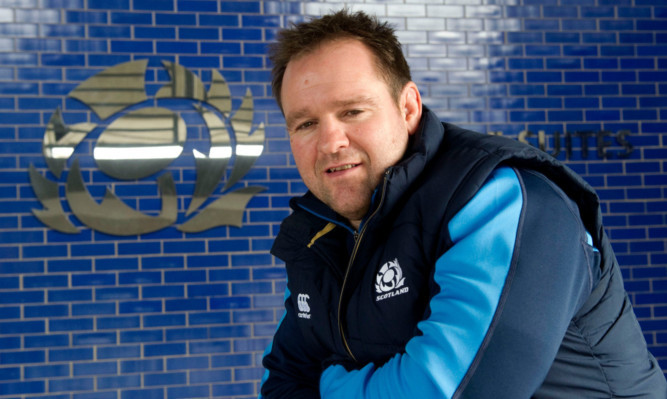Scotland will not change their approach to the scrum in Saturday’s final RBS Six Nations match in Paris despite the problems in defeat to Wales last weekend.
Specialist set-piece coach Steve Scott said the approach of the French ensured there would be a proper contest at the scrummage and, while he refused to criticise last Saturday’s referee Craig Joubert, the inference was clear.
“We want the scrum, we have got real pride and passion in that set-piece, it’s a powerful weapon that’s been getting penalties for us (in this championship),” insisted the former Gala, Edinburgh and Scotland hooker.
“The games leading into Saturday, we had teams under pressure there. The game against Italy was as good a scrummaging contest as I’ve seen in years.
“We don’t change what we’re doing, because the one thing is we’re going to France to play and everyone knows French front-row forwards love to scrummage.”
It is not in the French mentality to look at the way Wales gained an advantage on Scotland on Saturday and go the same way, he believed.
“Watch France’s games recently and they have turned over possession on 12 of the opposition’s 28 scrums,” he said.
“That tells me of the pressure they’re putting on and they’ll want to scrum on Saturday it’s bred inside them, it’s a central part of French rugby.”
Scott believes the scrum has actually improved since the new rules this season, although he accepts they have swapped the problem of continual re-sets with another of too many penalties and free kicks just three of 12 scrummages went to a conclusion on Saturday.
“I personally think the scrum engagement rules are better,” he said.
“They’re not spot on, but they’re better, there’s less re-sets and they’ve sharpened it up. The problem with penalties and free kicks needs to be managed better but the scrum is more balanced now.
“We won’t change our approach. If we were playing Wales again then obviously we would do it differently, and I think our next match against Wales will be very different.
“Scrums are still the best place to attack from because you’ve got 16 players in a confined space. France like to engage quickly and scrum properly which suits our game, and I think you’ll see a proper contest on Saturday.”
Scott would be happy to see any of the three candidates replace the injured Richie Gray on Saturday. He said John Barclay will come into consideration for a starting spot.
“Second row is an area of strength for us now,” he said.
“Al Kellock has just past his 50th cap and is a wonderful servant to Scotland, you’ve got young Grant Gilchrist coming through and Tom Ryder who has been doing well for Glasgow, so we’ve got no issues whoever goes in there.
“Our back row is the strongest it can be at the moment. If we had Ross Rennie, John Barclay and Chris Fusaro, all genuine open-sides, from the start, we might have chosen differently but I think it’s gone well there. John’s back in the squad this week and he’ll be in contention for selection.”
Scott insisted the breakdown performance improved over the last two games.
“We only had 20 balls from contact against Ireland and it was more than double that against Wales,” he said.
“The quality of our breakdown ball has to come when we get the ball in the opposition half, so we can win the gain-line and get quicker ball to build phases.”
Scotland added 11 players for training this week to the 22 remaining fit from Saturday’s game, using the main pitch at Murrayfield for yesterday’s session as the back pitches were still under snow.
Barclay, Gilchrist, Ryder, Glasgow hooker Pat McArthur, prop Jon Welsh and Alasdair Strokosch were added to the forwards, with Glasgow quartet Alex Dunbar, Peter Horne, Peter Murchie, Sean Kennedy and Worcester wing Nikki Walker brought in for the backs.
